Filed under:
In early June, I had the pleasure of joining the alumni community for reunion, the concluding event of the 2020-21 academic year. Of the many reunion traditions, I especially enjoy the Saturday morning “Year in Review” (video above) and the opportunity it provides for me to reflect on the year just ended.
Given the circumstances of this past year and the extraordinary efforts of our students, faculty, and staff to adapt and reimagine teaching and learning, I wanted to expand upon that presentation with this “year in review” report to highlight some key events and accomplishments for the entire Sarah Lawrence community.
As I do so, I want to acknowledge that we know that the experiences and challenges of the last year are not unique to Sarah Lawrence. While increasing vaccination rates and loosening restrictions in the United States are creating a sense of emergence, many of our community members around the world remain in the grip of the COVID-19 pandemic. In addition to a humanitarian and healthcare crisis, the pandemic shone a bright light on the simultaneous and systemic crises of racial (in)justice, climate change, and economic inequality. As an institution of higher education, it remains critical that we not only recognize but continue to respond through our work and our education to the devastation this virus and societal injustices have caused, and continue to cause, locally and around the world.
To start where we ended
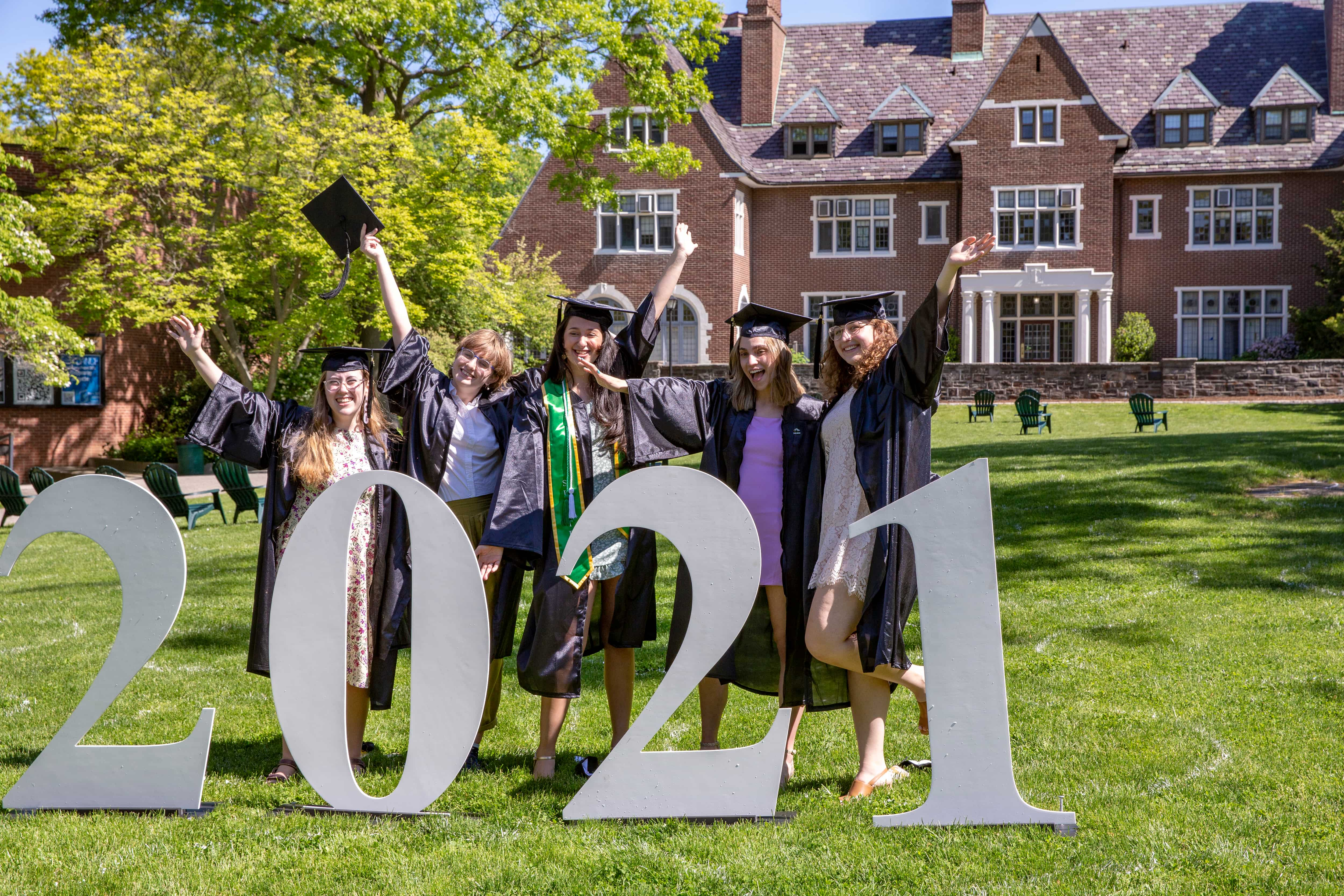
In mid-May Sarah Lawrence celebrated the graduation of the class of 2021, reimagining the possibilities for a ceremony and traditional events amidst our community’s shared realities of the pandemic—with members of the class spread around the the country and the world and with a commitment to equity and inclusion that would allow all of our graduates and their families and friends to participate fully wherever they were.
This year’s senior lecture—a longstanding SLC tradition that always follows the theme “A life of learning”—was delivered by history faculty Lyde Sizer. Not so traditionally, it was held outside, on Westlands lawn, for an in-person and virtual audience, following a block party and the senior toast. The senior Filmmaking and Moving Image Arts showcase took on a similar hybrid approach, with outdoor screenings complementing a virtual watch party. Senior thesis presentations and other end-of-semester celebrations, like the senior-don happy hour, were entirely online. And our graduate and professional programs hosted a rich range of virtual and hybrid events highlighting the work and celebrating the achievements of our master’s students.
You can watch both undergraduate and graduate ceremonies on our commencement website.
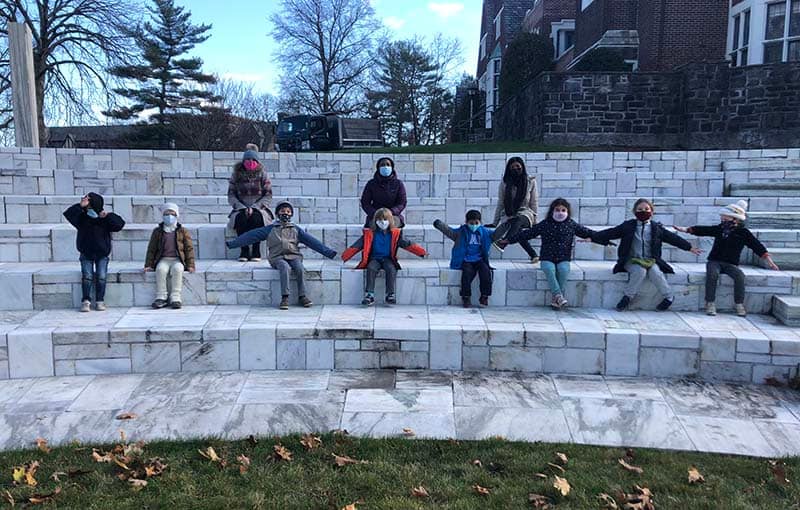
In addition to our undergraduate and graduate celebrations, each year I always enjoy one final “commencement”, as we celebrate the end of the academic year for our youngest learners, the 5-6 class at our Early Childhood Center. Those students, and their teachers and families, who conducted an entirely outdoors fall term, also showed enormous resilience this year, and it was quite moving to gather with them—not only in person, but inside—to mark the end of this phase of their education.
Adapting during a pandemic
As I have had reason to do often this year, I’d like to express profound thanks and admiration to our faculty, staff, and students for what they accomplished and to all in our community for your support. In what follows, I will attempt to offer a glimpse of what it has taken for Sarah Lawrence to successfully navigate through this year. And I would like to acknowledge that we began with a series of difficult decisions that required shared sacrifice of all of our community as we faced one of the most challenging years in the history of the College.
Before the academic year began last fall, faculty and staff spent countless hours developing plans that could accommodate a residential experience for a portion of our students, but that also reflected the reality that much of our work and interaction would need to be virtual and that we needed to rapidly reimagine teaching and learning in this new environment. Together, our students, faculty, and staff engaged in new ways and the College’s campus, which typically houses around 1,150 of our approximately 1,400 undergraduates, welcomed roughly 450 students each semester, with another 150-200 living nearby and commuting to campus, and our remaining students living around the world.
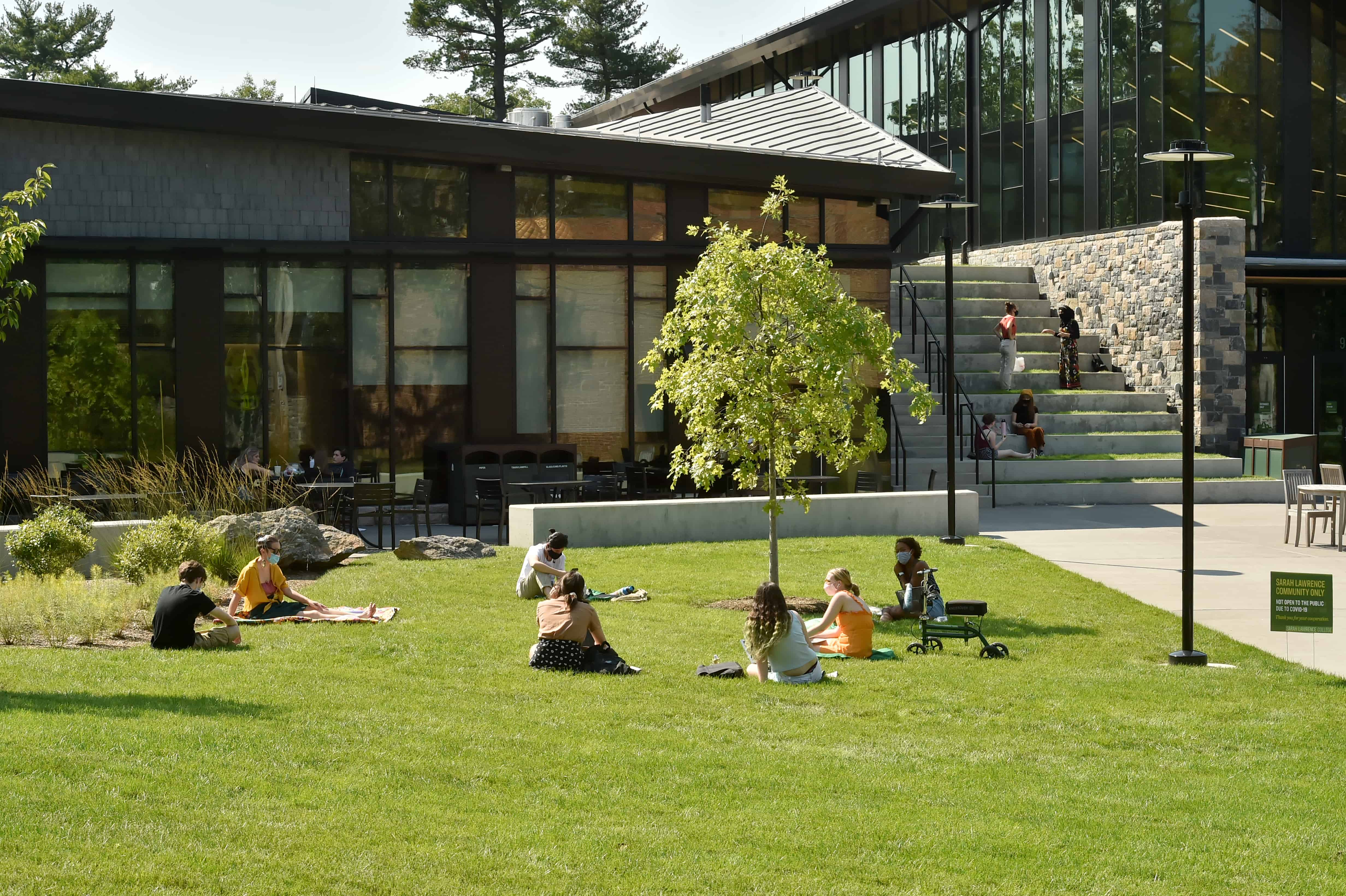
Spaces that were architecturally designed to bring people together were reconfigured to promote social distancing, signage was installed to remind everyone about wearing a mask, new cleaning practices were adopted, and our Health & Wellness staff oversaw and administered thousands of COVID tests, with protocols to identify and mitigate virus spread as quickly as possible. Students were housed in single rooms; MacCracken and OSilas were set aside as quarantine and isolation spaces; meals were served “grab and go”; tents were provided for outside instruction. Our IT staff introduced new resources and training, software was licensed, and computers and hot spots were delivered to students who needed them. Lab kits and art supplies were mailed around the world. The library developed new ways to deliver materials. These were but a few of the myriad logistical measures implemented to insure the health and safety of our community. As our student engagement team worked tirelessly to keep our students connected virtually and in-person, our RAs took on an even more important role than usual in building and supporting community, and our mental health staff increased programming and support services. We were fortunate to have instituted 24-7 tele-counseling prior to the pandemic, which proved an essential resource for students.
The College’s success this year, with an overall positivity rate well below 1%, was highlighted in National Geographic and is a direct reflection of our community’s hard work, dedication, and care and consideration for one another. Building on the success of the fall, we were able to reintroduce activities like athletic competition in a modified form. This past spring, not only did our teams manage the remarkable record that not a single athlete tested positive for COVID, but our creativity in fielding a co-ed volleyball team caught the eye of CBS. Restrictions on capacity and spectators meant that I was often the only fan in the stands, grateful for this privilege to represent our community to cheer our students on, while others watched via livestream.
The majority of SLC students, faculty, and staff are now vaccinated, or on their way to being fully vaccinated. And last week, SLC was proud to join the White House’s COVID College Challenge, which is part of President Biden’s goal for 70% of adult Americans to receive the first dose of a vaccine by the Fourth of July.
Some lessons learned
While we anticipate the coming fall will bring with it a closer return to pre-pandemic operations, we will also carry forward lessons learned.
Our faculty quickly took action last summer to create online partial-credit summer courses for incoming students so that they could start acclimating to college-level coursework before the start of the semester. These courses were fully enrolled in a matter of days and complemented another new program, Belonging at SLC, developed by staff and student leaders designed to help students transition to the College, as well as SLC Reads, a shared reading experience for the first year class that our entire community was invited to join. Fall course registration was conducted entirely online in advance of the semester and our performing arts programs built technology and distance into their movement and performances, with virtual auditions and entirely new modes of real-time, virtual interaction. Welcoming visiting speakers to classes, working with guest choreographers, and touring virtual art galleries and exhibits from around the world became routine, no longer limited by geography or physical proximity. Career Services and Alumni Relations worked together to host an extraordinarily rich series of panels drawing on our global alumni network as we deepened and broadened connections within the Sarah Lawrence community and for our students.
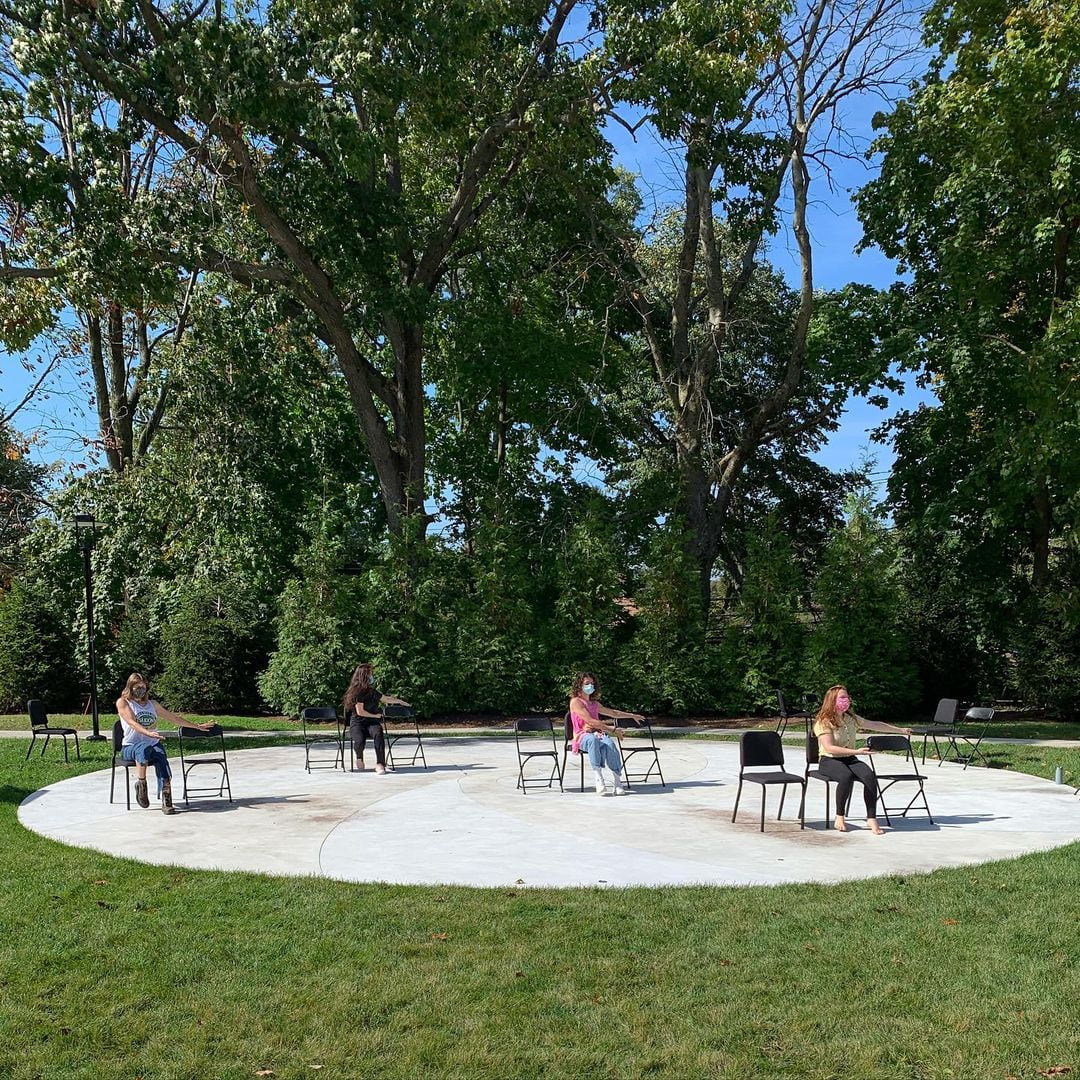
These are just highlights of a few of the many innovative ideas and plans our talented faculty, staff, and students put into action this year, and we will continue to build on these successes and enhance how we engage with one another and our community as the world continues to evolve.
Faculty achievements
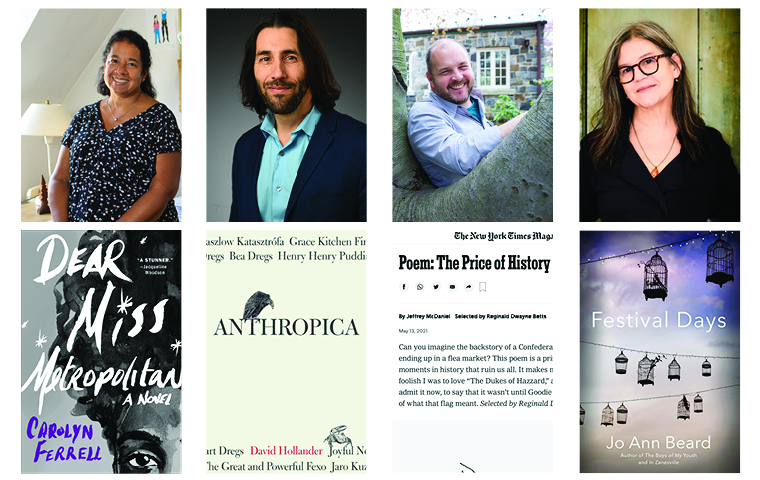
Sarah Lawrence faculty continue to be recognized for leadership and accomplishments in their fields and to work with each other across the curriculum to expand the opportunities for our students.
Among those achievements, Writing faculty members Jo Ann Beard and David Hollander published new books—Festival Days and Anthropica, respectively—to much critical acclaim, and Jeffrey McDaniel’s poem, “The Price of History,” was recently featured in The New York Times Magazine. And Dear Miss Metropolitan by Writing faculty member Carolyn Ferrell ’84 has already received much attention in advance of its debut later this summer. (I know what my summer reading will be!)
Kate Zambreno, who holds the College’s Strachan Donnelley Chair in Environmental Writing, received a Guggenheim Fellowship for 2021 in the General Non-fiction category, as did MFA Writing faculty member Joshua Bennett, who was named both a Guggenheim Fellow and Whiting Award recipient. In addition, History faculty member Matthew Ellis, the Christian A. Johnson Endeavor Foundation Chair in Middle Eastern Studies and International Affairs, received the Rome Prize, a prestigious award from the American Academy in Rome, and spent the spring semester abroad, focused on a research project about Italian colonialism in Libya.
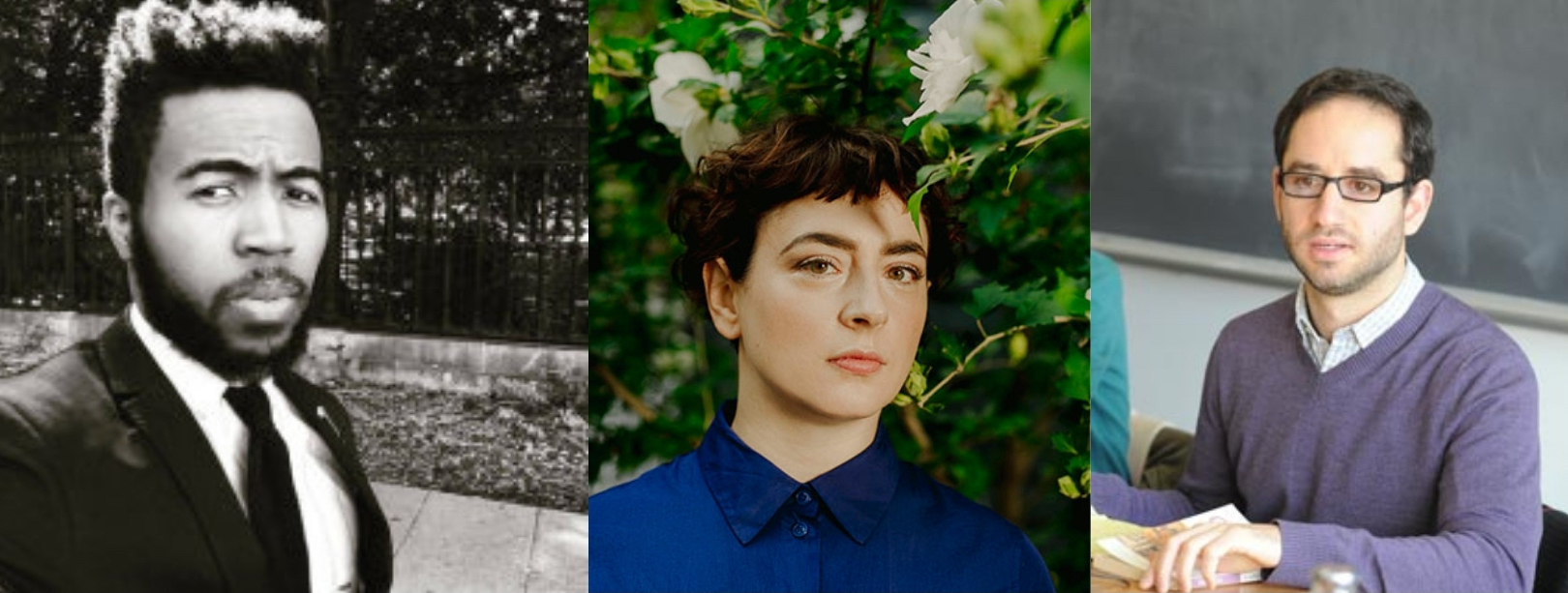
And curricular innovation continued apace. To cite just one example, faculty members Michelle Hersh, An Li, Bernice Rosenzweig, Sarah Hamill, Charles Zerner, and Eric Leveau, collaborating with colleagues across the College, launched a new course cluster called the “Sarah Lawrence Interdisciplinary Collaborative on the Environment” (SLICE). This new cluster, which includes courses in Art History, French, Literature, Environmental Science, and Biology to name just a few, brings together the tools from each discipline and empowers students to explore a common topic across the myriad fields of studies connected to the environment.
We welcomed two new tenure-track faculty members to the College this year, both of whom made immediate and important contributions to the curriculum. Maia Pujara, a neuroscientist whose scholarship focuses on the effects of emotion on decision-making, well-being, and mental health, taught courses on neurophysiology, happiness, and neuropsychology. Bernice Rosenzweig, who you read about briefly in the previous section, joined SLC’s Environmental Science faculty and holds the OSilas Endowed Professorship. Her research focus on urban hydrology and climate change resilience is especially topical as communities like Westchester and New York City simultaneously work toward slowing down climate change while also preparing for its effects. In the fall we will welcome Elias Rodriques in African American literature, following his Woodrow Wilson Fellowship. (And Elias’ novel, All the Water I’ve Seen is Running, out this summer, is also receiving notable pre-publication attention.)
I would also like to extend a heartfelt congratulations to two faculty members who were awarded tenure this year: History faculty Philipp Nielsen and John Jasperse ’85, who leads the College’s dance program.
Finally, I want to acknowledge with gratitude those faculty members who concluded their service in the classroom this year. Beloved faculty members Bella Brodzki, Michael Spano, Isabel de Sena, and Jan Drucker, who combined have taught for more than 130 years at Sarah Lawrence, retired at the end of the semester. Their substantial contributions to the College and to its students will forever be remembered as they begin their well-deserved next chapters.
Creating a new model for college and community partnerships
In 2019, the College received a five-year, $1.2 million grant from the Mellon Foundation, the largest programmatic grant in college history, to advance civic engagement in our geographic area through the humanities. As part of this grant, the College created a fellowship program for early career academics that supports a new model for how colleges and community partners can work together to support shared goals.
This year, Dr. Kishauna Soljour and Dr. Yeong Ran Kim joined the College as a Public Humanities Fellow and Digital Media Fellow, respectively. Dr. Soljour’s appointment is shared between Sarah Lawrence and the Yonkers Public Library, where she has created and leads the African American Oral History project. This in turn was incorporated in a new course she taught at the College called The City of Yonkers: Histories of Change, Continuity, and Community.
Similarly, Dr. Yeong Ran Kim worked closely this year with Yonkers Arts, the Hudson River Museum, and Center Lane, an LGBTQ+ youth center, to help tell these important community partners’ stories through digital media and to support collaboration with SLC students, faculty, and staff. Building on previous work with public art exhibits, Dr. Kim directed a video for Yonkers Arts about the organization’s “Art in the Park” initiative, which seeks to bring the arts directly into community spaces by beautifying parks and basketball courts through murals, sculpture, and transforming natural landmarks in creative ways to become art themselves.
In the fall we will welcome Dr. Emily Bloom as a Public Humanities Fellow, joining Dr. Soljour and Dr. Kim. Her academic work focuses on media institutions and transnational literary networks and she will be embedded at our community partner Wartburg in Mt. Vernon while also holding a faculty appointment and teaching at the College.
More about this initiative is available here.
Deepening engagement
This year, Sarah Lawrence conducted the majority of our events through remote platforms like Zoom, often with members of the campus community logging in with their pods, or as the spring progressed, with classmates joining watch parties in the Campus Center, the library, or, when the weather allowed, on Westlands lawn.
Our Office of Alumni Relations, which typically hosts small gatherings around the world with students, alumni, and faculty, shifted its events online with exceptional success. For the 2020-21 academic year, they hosted events ranging from discussion of the COVID-induced “new normal” of the workplace to how our alumni foster diversity, equity, and inclusion in their careers. This change made it possible for more than 7,000 registrants from 39 countries to join the conversation and to be Sarah Lawrence Together across time zones and geography.
Professor Joe Forte recognized that the five-week online course he had created for incoming students last summer offered a new model for engaging alumni and others in our lifelong learning and piloted the first of what became three successful seminars for alumni. And we have been able to make events that previously would have been open only to the campus community or those able to come to campus available globally in real-time interaction. Many alumni gratefully noted that it was the first time since their graduation that they had been “back” to the College, and families were able to participate with their students in a wide range of events.
When I arrived at Sarah Lawrence in 2017, I inaugurated a year-long series on the theme “Democracy and Education” and in each year since have sought to foster community dialogue and exploration of ideas through a related and urgent topic. This year’s theme was Justice and the myriad contexts it manifests in today’s society, from environmental and economic to race and immigration, to name just a few. In early November, just days after the election, I was delighted to welcome presidential historian Douglas Brinkley for a conversation about the presidential election and that pivotal moment in American society. Of course, we didn’t know when the date was decided upon that we wouldn’t know who had won the election until the next day.
In February, shortly after the presidential inauguration, Dr. Eddie Glaude Jr. joined us for a conversation about his most recent book Begin Again: James Baldwin’s America and Its Urgent Lessons for Our Own, which discusses Baldwin’s disillusionment with the Civil Rights movement and America’s failure to confront its own falsehoods regarding race and equality.

Fittingly, the final offering in our Justice series this year was our commencement speaker, Congressman Jamaal Bowman. A lifelong educator, he discussed how our society considers brilliance, urging us to make our collective priority to provide, for all children, the care and attention necessary to unlock their brilliance, no matter where they are from.
More information regarding the Justice series, as well as videos of all the events, is available here.
While we can’t wait to be together in person on campus, to welcome the Class of 2020 back to reconnect them after their final year was so disrupted, and to celebrate deferred reunions, we have learned much this year about how to extend our reach and how to celebrate the full potential of our global community. We are eager to build on these connections and to continue to ensure that, where meaningful and appropriate, virtual engagement remains a key and complementary component of our work ahead.
Support for the College
Gifts to the College from our community are integral to Sarah Lawrence’s continued support for students, faculty, and the College as a whole, and they have never been more critical than during this period of financial challenges associated with COVID-19. We are deeply grateful for the stalwart support of the Sarah Lawrence community.
To offer just one example of that support, in March, we celebrated Giving Day and together 1,491 donors—305 more than the College's previous participation record—raised more than $1.22 million in funds that were put to immediate use. From financial aid and student life to research grants and career services, gifts to our annual fund support our one-of-a-kind education and ensure the transformational experience of a Sarah Lawrence education will be accessible for generations of students to come.
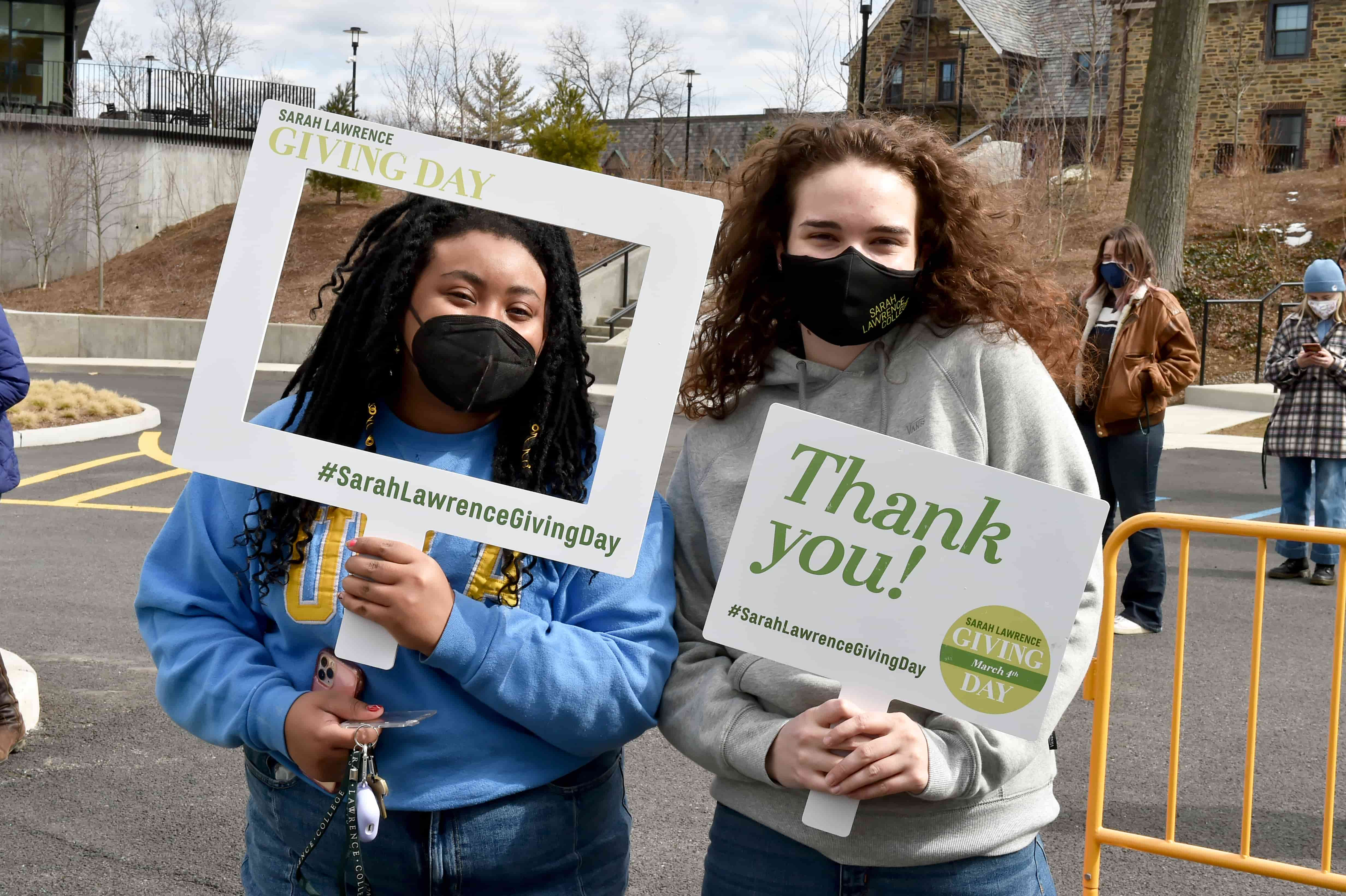
Whether you made a gift on Giving Day, participated in our facemask giveaway in the fall, volunteered to host an event, donated your time to mentor our students, provided an internship, or supported the College in another way this year, thank you for your support during what has been a challenging year for all of us and for your recognition.
Looking ahead
I began this report by celebrating the class of 2021, and so it seems fitting to end by providing a brief introduction to the class of 2025. The incoming first year class comes from the largest cohort of applicants in SLC history, with 4,500 students from around the world applying for roughly 400 spots – a 20% year-over-year increase that builds on several record-breaking application numbers in recent years. It’s clear from getting to know our incoming class that, like our current students and alumni, its members are creative, outside-the-box thinkers who are passionate about learning. They will benefit from much that we learned this year, as they have the opportunity this summer to take partial-credit online courses and to participate in Belonging at SLC and SLC Reads as part of their orientation before they ever arrive on campus.
This fall I also look forward to welcoming new transfer students from Bronx and Westchester Community Colleges as part of a new transfer agreement we finalized in March. The program—intentionally created with neighboring institutions—identifies high-achieving students from each community college and guarantees that, if admitted to Sarah Lawrence, they will matriculate with junior standing, their full demonstrated financial need for tuition and fees will be met, and they will be on track to complete their Bachelor of Arts two years after enrolling, among other benefits.
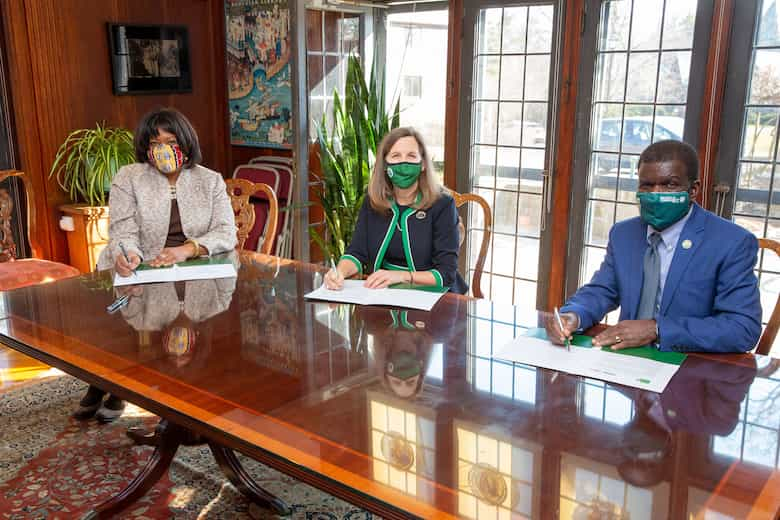
Over the summer, as the campus prepares for the resumption of a full residential environment, we will also welcome EXPLO, a summer camp for roughly 600 eighth to tenth graders. These young students will live and learn on campus and develop a sense for what college life is like while taking classes in areas from acting and architecture to forensic science and global economics. Some campers may even find themselves joining the class of 2030 a few years from now. With the approval of the College’s Curriculum Committee, we have also partnered with EXPLO to offer Sarah Lawrence credit for a suite of their offerings to high school students, deepening our partnership with a like-minded K-12 non-profit and also expanding our reach.
Establishing partnerships with like-minded organizations like BCC, WCC, and EXPLO to facilitate pathways for capable students to enroll at Sarah Lawrence and engage with the College will be integral to our long-term success. As an institution we must continue to build on our exceptional strengths by seeing around the corners, as we have since our founding, and evaluate and embrace new opportunities that build on our key strengths to advance our mission and position the College on the leading edge, from early childhood through professional and continuing education.
I hope that this report has offered you some sense of this past year at Sarah Lawrence, even as it only skims the surface of the work and dedication of this community. It is a truism to observe that these are incredibly challenging times for small residential colleges and for sustaining our model of education. And events of recent years have significantly amplified those challenges for the College and for our students. As I often say, Sarah Lawrence is a small school with an outsized footprint in the world. Our students, faculty, staff, and alumni have facilitated the creation and expansion of entire fields, like genetic counseling, of which Sarah Lawrence was the first to establish a graduate program. We have been in the business of lifelong learning since our founding. Our mission, our geography, and our powerful model of education provide the foundation for our next 100 years of operations and I look forward to sharing the exciting initiatives underway as we move forward into our second century. Sarah Lawrence Together, indeed.
Cristle Collins Judd
President